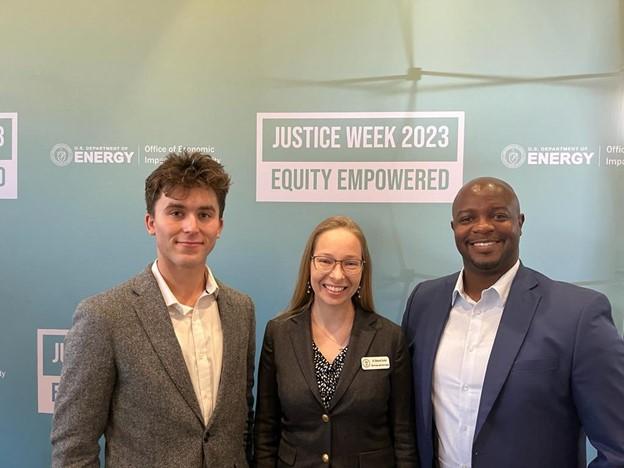
Tufts Team Thrives in U.S. Department of Energy (DOE) Competition
This past September, six Tufts students were brought together by faculty mentor Professor Justin Hollander of the Department of Urban and Environmental Policy and Planning (UEP) to take part in the U.S. Census Bureau’s 2023 TOP University Sprint, a 12-week product development competition. In partnership with the U.S. Department of Energy (DOE) Office of Economic Impact and Diversity and the White House Office of Science and Technology Policy, the following Tufts students participated: Alexandra Barancikova, Deniz Karabakal, Derrick Seegars, Gabriel Mogollon, Hugo Rengifo, and Prajna Cauvery Kotera Pooviah. These students joined university teams from around the country to develop new and creative ideas for "Improving Access to Electrical Power for Climate Resilience." Each participating university was challenged to create a digital product using federal open data to ensure that communities overburdened by power outages are not left behind as electrification advances towards an equitable, clean energy future. Under the leadership of Professor Abani Patra, the Data Intensive Studies Center (DISC), along with the Office of the Vice Provost for Education and the School of Arts and Sciences provided the funding to allow the team to participate in the competition.
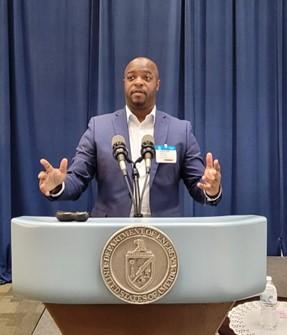
|
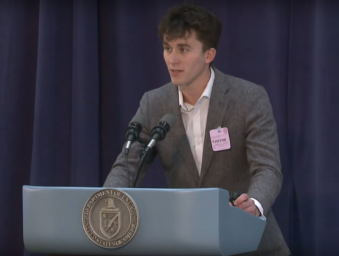
|
The federal TOP coordinators gathered a group of user advocates--community leaders, activists, and people with relevant lived-experience--to provide insight based on their expertise and community connections, all to help teams identify realistic and useful solutions in addressing the electricity challenge. According to Gabriel Mogollon, a third-year undergraduate in Environmental Engineering, conversations with user advocates “played a significant role in the actual decision-making process.” User advocates expressed that organizations often struggle to secure grants due to the complexities in navigating the application process, grappling with unfamiliar terminology, and needing to invest significant time and resources. Having recognized the pivotal role of funding in propelling community initiatives, the team opted to place the grant application process at the center of their efforts, seeking to design an application that could streamline and demystify this often-daunting process.
Shortly after the development of this project concept, the team had the opportunity to send representatives to Washington, DC to attend and present at the DOE’s Justice Week 2023: Equity Empowered. At this five-day hybrid event geared toward creating a more equitable, clean, and just energy future, Seegars and Mogollon, along with other TOP participants, presented a short talk on their work. In addition to receiving feedback on the product idea, Seegars and Mogollon were able to meet other TOP participants and see the direction their projects were taking. According to Mogollon, “hearing the speakers that the DOE brought in really inspired our team to continue on the trajectory which we were traveling in since we kept hearing about the importance of ensuring federal funds were accessible.” Overall, both Tufts’ representatives found taking part in Justice Week to be an amazing experience. Derrick Seegars, a first-year graduate student in UEP, expressed that “it really felt like we were a part of something special and that the work we were doing had an impact on people's lives.”
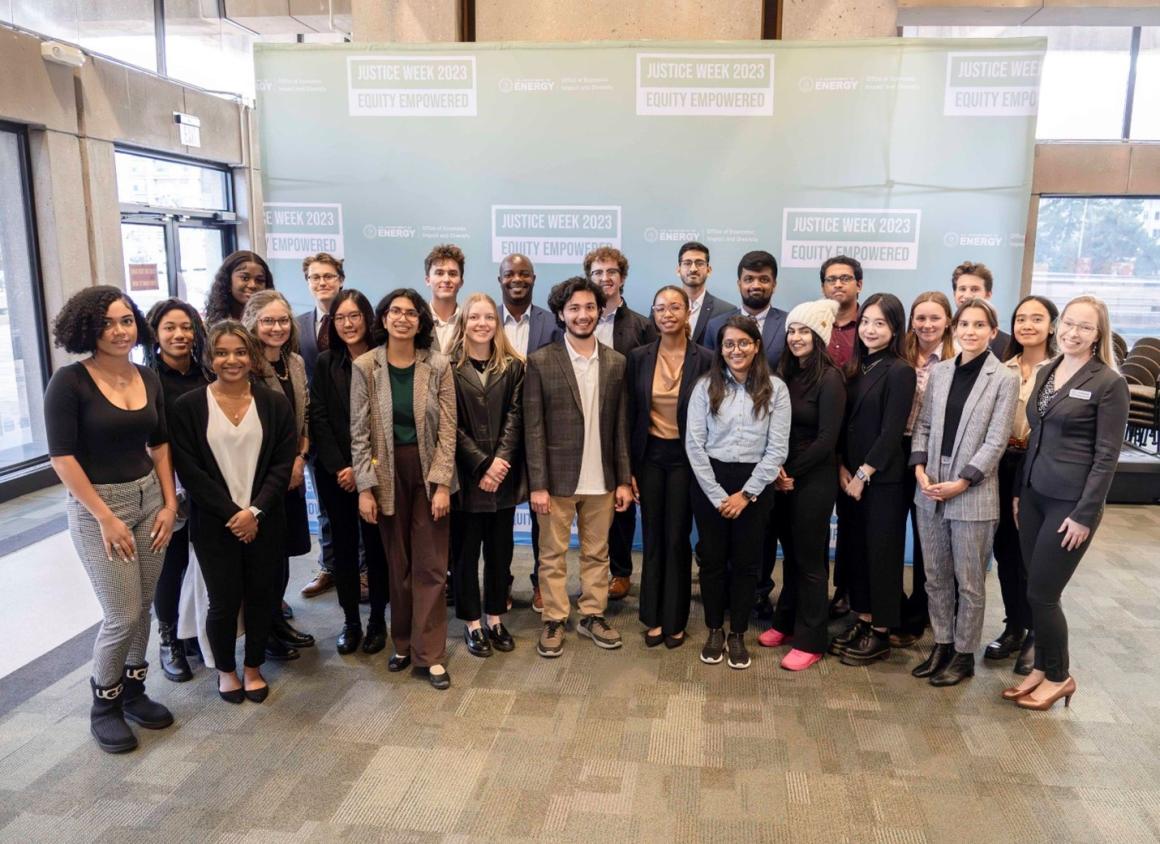
|
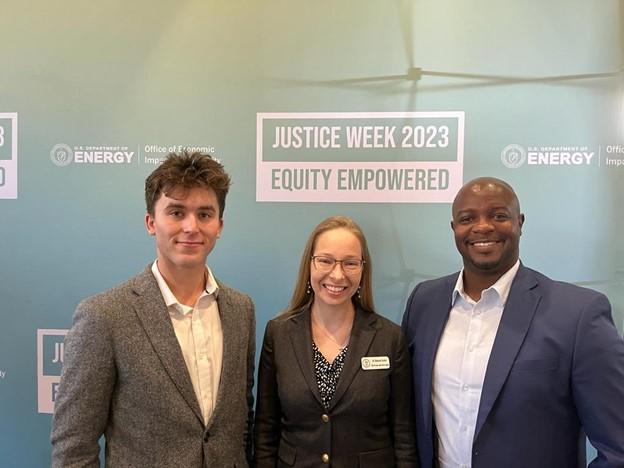
|
Following Justice Week, the team advanced their product idea by beginning the creation of a sequence-to-sequence large language model. This AI powered model uses non-parametric inputs in the form of approved grant proposals and parametric inputs via user input. TOP check-ins helped further improve the product, according to Deniz Karabakal, a second-year graduate student in UEP. He stated, “comments from the other groups and TOP experts helped us identify potential flaws and drawbacks to our approach, such as the potential for bias in the machine learning model.” Their input resulted in the team incorporating language translation into their tool to increase accessibility.
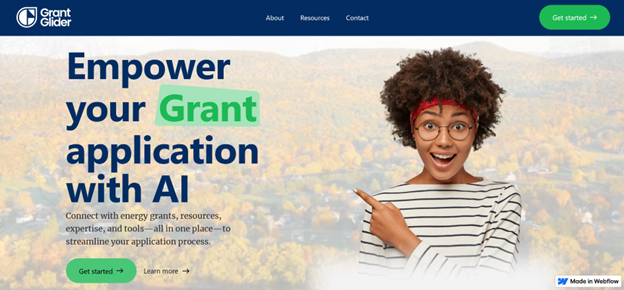
|
The weeks-long process ultimately resulted in GrantGlider. Targeted at policy makers, non-profits, private organizations, and local governments, the aim of the GrantGlider website is to simplify the energy grant application process, enhancing communities’ access to the resources they need to thrive in a resilient and equitable energy landscape.
As of now, GrantGlider serves to help entities apply specifically for the Massachusetts GAP III Energy Grant. While the Census Open Innovation Summit in early January marked the official end of TOP, some members intend to continue the growth of GrantGlider. By securing further resources and funding, they can add more grants and continue developing this software to allow more communities and users to save time and improve their odds of receiving funds. Seegars specifically highlighted the tool’s potential to increase equity, stating that he hopes “the app becomes more popular within the target communities that need access to grant funding… I'm hoping that it is just the start for Grant Glider.” Professor Hollander has also expressed his faith in the future of the product, stating “the DOE was very impressed with the GrantGlider product, and I am hopeful that it will garner some attention from DOE or industry partners in the weeks to come.”
The Tufts team is deeply grateful to DISC, the Office of the Vice Provost for Education, and the School of Arts and Sciences, without whose support GrantGlider would not have been possible. And while team members may be headed in different directions, each is going forward with shared experiences and valuable takeaways for their academic and professional careers to come. In particular, Karabakal is grateful for his newfound awareness of many federal datasets, and from this experience he “learned about the problems related to social inequity that could be exacerbated by the electrification of society during the Energy Transition.” Mogollan is proud of the “cutting edge nature and ingenuity of GrantGlider” as well as its high potential for being scalable and applicable for the average American up to the federal government. Seegars, upon reflecting on his experience, expressed that his involvement in TOP made him “have an appreciation for how the government, used in the right way and motivated to help the people they serve, can really be a beacon of good with the resources they have at their command.”
In the wake of their TOP journey, the Tufts team not only leaves behind GrantGlider as a testament to their dedication, but also carries forward a wealth of insights, skills, and a shared commitment to fostering a resilient and equitable energy landscape.
